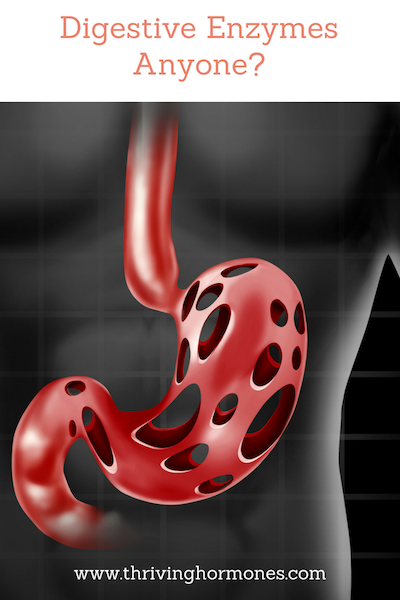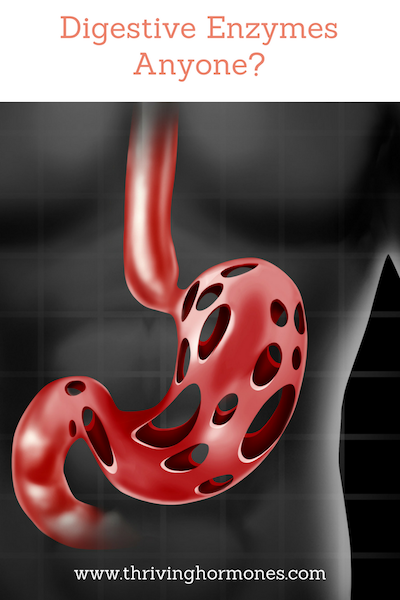Digestive enzymes anyone?
Digestive enzymes are great! They help you digest food and when taken in between meals help reduce inflammation.
Not all of them are created equal though, and not everybody should be taking them.
As a practitioner, I find that most people with digestive issues would like to jump straight into using a supplement. They are looking for a “magic pill” for everything without trying different options first. I like to try other strategies first. It is worth to mention that some supplements can be harmful if misused and can have interactions with drugs and other supplements.
So, let’s talk of a few of the common digestive enzymes, what they do, and who should take or NOT take them.
What are digestive enzymes?
“Enzymes” are compounds that help critical biochemical reactions to happen in your body. These responses can be anything, from burning food for energy, breaking down the food into smaller pieces that our gut can absorb to making neurotransmitters like serotonin. All the enzymes end with “ase” so you can readily recognize them. Digestive enzymes are explicitly used for digestion, and our digestive system naturally makes and secretes when we eat. All of the “macronutrients” we eat (protein, fat, and carbs) have to be broken down into individual (smaller) parts so that we can accurately absorb and digest them. Otherwise, they are too big, and if we don’t absorb them properly, we might experience symptoms of fatigue, digestive distress, malnutrition, or a host of other symptoms.
Most common digestive enzymes you’ll see on product labels are:
Lactase – Helps to break down lactose into its sugars.
Amylase – Helps to break down starch into its sugars.
Galactosidase – Helps to break down specific “fermentable carbohydrates” into its sugars.
Protease – Helps to break down protein into its amino acids.
Papain and Bromelain – They help to break down protein into its amino acids.
Lipase – Helps to break down fats into its lipids.
Who should be taking digestive enzymes?
First I always recommend that you see a qualified healthcare practitioner for an expert opinion on whether your issues can be related to digestion, and if any, supplements can help you.
The most common digestive symptoms that enzymes might be able to help are bloating, gas, cramping, constipation, belching, and diarrhea, especially if it happens after eating certain foods (think gluten intolerance or lactose-intolerance symptoms). The enzymes might take stress off of the stomach, liver, gallbladder, pancreas, and small intestine by helping break down difficult-to-digest proteins, starches, and fats. One of the reasons for these symptoms to occur might be that those food particles are not being broken down properly, and the larger particles travel further down the digestive tract to the microbiota where those little critters start breaking them down themselves. This process might be troublesome for some people. Healthy gut microbiota is essential for good health. Research is showing that it can affect not only our digestion, but also our immune system, and even very importantly our mood!
Digestive enzymes might help with age-related enzyme insufficiency.
With age, the acidity of our stomach acid becomes more alkaline. In other words, as we age our stomach acid and enzymes production decreases. There’s increasing suspicion that digestive problems may result from either low stomach acid or enzyme insufficiency in the elderly, which could be what causes acid reflux. Hypochlorhydria is insufficient stomach acid and gastric secretions. The digestive system can’t break the food and, and minerals, vitamins, and nutrients can’t be released and be absorbed from food.
Digestive enzymes benefits:
* They can improve symptoms of IBS and acid reflux
* Can help heal leaky gut by taking stress off the GI tract
* They help break down difficult-to-digest protein and sugars like casein, lactose, and gluten
* Improve absorption of nutrients
*Make digestion of beans easier
What do I need to know?
1 -Read the label of any products you take. Take them as directed, especially if they’re not explicitly recommended for you by your healthcare practitioner who best knows your history.
2 – Digestive enzymes that break down carbohydrates into sugars are not recommended for diabetics or pregnant/breastfeeding women. This is because taking them breaks down more carbohydrates into sugars than your body normally would; so, anyone at risk of blood sugar issues should take caution.
3 – Digestive enzymes that break down proteins into amino acids, should be avoided by certain people with an ulcer, people having surgery and people who are on blood-thinners or anti-inflammatories, because of potential interactions (they can cause or worsen ulcers, as well as have the ability to “thin” the blood and prevent normal clotting).
4- Possible Side effects – If you have been using digestive enzymes supplements for a prolonged period and they are not helping or you are felling worst you should check in with your healthcare practitioner. There may be other strategies than daily supplementation that can serve you better. Allergies are always a possibility, so if you know or suspect you’re allergic avoid them.
Keep supplements away from children!
Before considering a digestive enzyme supplement, try to eat slower, relax more, and chew more thoroughly. Following this will helps to break down food and can put less stress on your digestive tract. The second step would be to try eliminating certain troublesome foods from your diet (dairy & gluten, for example) and see if that helps.
Recipe: Tropical (digestive) smoothie (containing bromelain & papain)
Serves 1
1 cup pineapple, diced
1 cup papaya,
diced 1/2 banana, chopped
1 cup coconut milk
1 teaspoon lemon juice
Put all ingredients into the blender and blend.
Serve & enjoy!
Tip: The levels of enzymes in whole pineapple and papaya aren’t as concentrated as taking them as a supplement; so if you’re not allergic to these delicious fruits, you can try this smoothie.
In Health,
Angie
If you have any digestive issues mentioned before check out my Restore Your Gut Program! The program is designed to heal your gut! Click on the image!
References: https://www.dietvsdisease.org/digestive-enzyme-supplements/
http://webprod.hc-sc.gc.ca/nhpid-bdipsn/monoReq.do?id=514&lang=eng
http://webprod.hc-sc.gc.ca/nhpid-bdipsn/monoReq.do?id=516&lang=eng
http://webprod.hc-sc.gc.ca/nhpid-bdipsn/monoReq.do?id=196&lang=eng
http://webprod.hc-sc.gc.ca/nhpid-bdipsn/monoReq.do?id=508&lang=eng
http://webprod.hc-sc.gc.ca/nhpid-bdipsn/monoReq.do?id=515&lang=eng
Natural Medicines Database, Bromelain, Papain, Retrieved January 21, 2017 from https://naturalmedicines.therapeuticresearch.com



